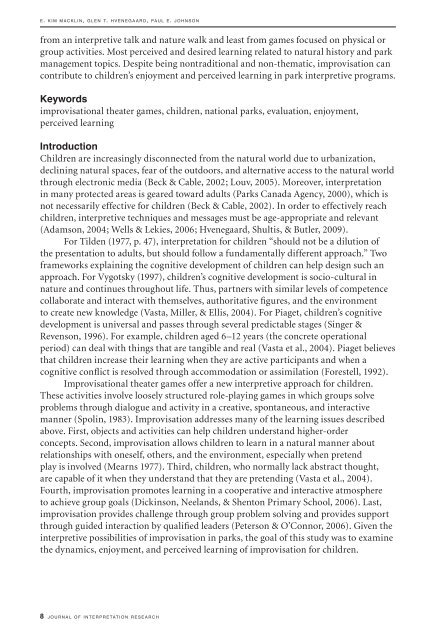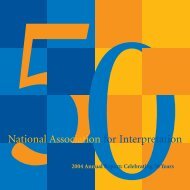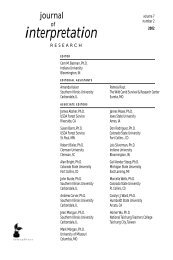interpretation
Volume 15, Number 1 - National Association for Interpretation
Volume 15, Number 1 - National Association for Interpretation
Create successful ePaper yourself
Turn your PDF publications into a flip-book with our unique Google optimized e-Paper software.
e. k i m m a c k l i n , g l e n t. h v e n e g a a r d , p a u l e. j o h n s o n<br />
from an interpretive talk and nature walk and least from games focused on physical or<br />
group activities. Most perceived and desired learning related to natural history and park<br />
management topics. Despite being nontraditional and non-thematic, improvisation can<br />
contribute to children’s enjoyment and perceived learning in park interpretive programs.<br />
Keywords<br />
improvisational theater games, children, national parks, evaluation, enjoyment,<br />
perceived learning<br />
Introduction<br />
Children are increasingly disconnected from the natural world due to urbanization,<br />
declining natural spaces, fear of the outdoors, and alternative access to the natural world<br />
through electronic media (Beck & Cable, 2002; Louv, 2005). Moreover, <strong>interpretation</strong><br />
in many protected areas is geared toward adults (Parks Canada Agency, 2000), which is<br />
not necessarily effective for children (Beck & Cable, 2002). In order to effectively reach<br />
children, interpretive techniques and messages must be age-appropriate and relevant<br />
(Adamson, 2004; Wells & Lekies, 2006; Hvenegaard, Shultis, & Butler, 2009).<br />
For Tilden (1977, p. 47), <strong>interpretation</strong> for children “should not be a dilution of<br />
the presentation to adults, but should follow a fundamentally different approach.” Two<br />
frameworks explaining the cognitive development of children can help design such an<br />
approach. For Vygotsky (1997), children’s cognitive development is socio-cultural in<br />
nature and continues throughout life. Thus, partners with similar levels of competence<br />
collaborate and interact with themselves, authoritative figures, and the environment<br />
to create new knowledge (Vasta, Miller, & Ellis, 2004). For Piaget, children’s cognitive<br />
development is universal and passes through several predictable stages (Singer &<br />
Revenson, 1996). For example, children aged 6–12 years (the concrete operational<br />
period) can deal with things that are tangible and real (Vasta et al., 2004). Piaget believes<br />
that children increase their learning when they are active participants and when a<br />
cognitive conflict is resolved through accommodation or assimilation (Forestell, 1992).<br />
Improvisational theater games offer a new interpretive approach for children.<br />
These activities involve loosely structured role-playing games in which groups solve<br />
problems through dialogue and activity in a creative, spontaneous, and interactive<br />
manner (Spolin, 1983). Improvisation addresses many of the learning issues described<br />
above. First, objects and activities can help children understand higher-order<br />
concepts. Second, improvisation allows children to learn in a natural manner about<br />
relationships with oneself, others, and the environment, especially when pretend<br />
play is involved (Mearns 1977). Third, children, who normally lack abstract thought,<br />
are capable of it when they understand that they are pretending (Vasta et al., 2004).<br />
Fourth, improvisation promotes learning in a cooperative and interactive atmosphere<br />
to achieve group goals (Dickinson, Neelands, & Shenton Primary School, 2006). Last,<br />
improvisation provides challenge through group problem solving and provides support<br />
through guided interaction by qualified leaders (Peterson & O’Connor, 2006). Given the<br />
interpretive possibilities of improvisation in parks, the goal of this study was to examine<br />
the dynamics, enjoyment, and perceived learning of improvisation for children.<br />
8 j o u r n a l o f i n t e r p r e t a t i o n r e s e a r c h












